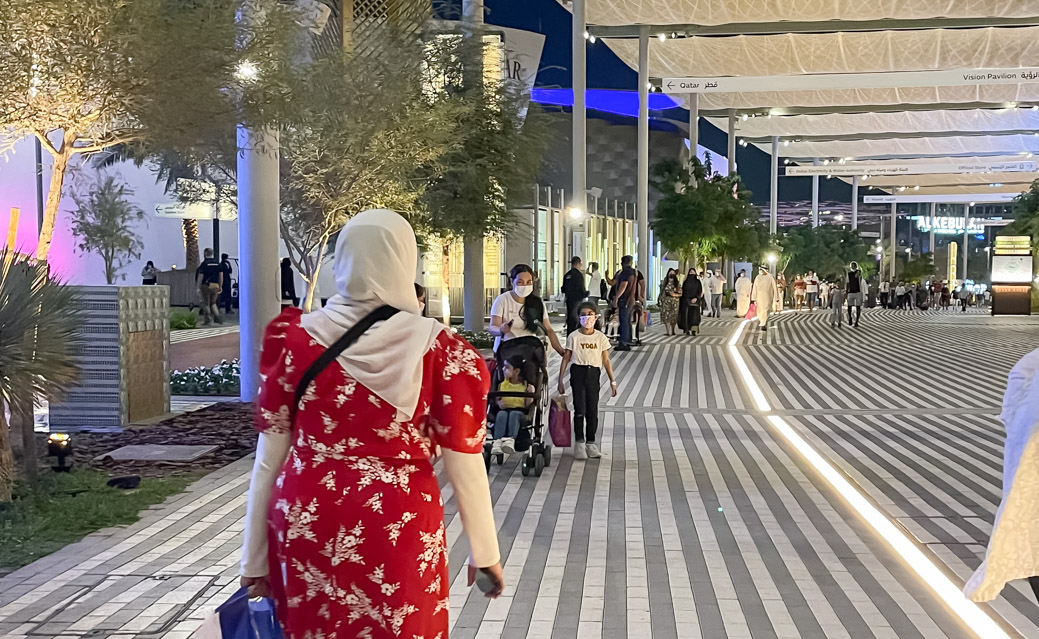The darkness behind the flashy lights of Expo 2020 in Dubai
The UAE’s promises of sustainability, opportunity, and mobility have been betrayed by the country itself.
Last week, I was one of the first few thousands to attend the 2020 Expo in Dubai. It opened on October 11, 2021, and estimates 25 million attendees in the six months it will be open. The expo is a global event that takes place every half decade with the mission to find solutions to some of the challenges that humanity faces. These challenges are transformed into themes and through this each contributor develops activities and displays the ways they can use their technology and culture to tackle them. While it is rooted in technosolutionism—using technology and engineering to solve global issues— the underlying incentive is to increase tourism and commerce rates for the host country, while the participating countries display the best of their people and technology.
For an event promoting sustainability, opportunity, and mobility, the intentions of Expo 2020 are anything but that.
At first glance, the Expo felt surreal—a giant display of the latest technology and skills from around the world in one place. It was like a land of its own, with the beautiful buildings, robots rolling around the decorated halls, and buggies full of people to navigate the giant sections. It was evident that each pavilion had been carefully crafted to display elements of the country’s culture.
However, this awe was not long-lasting.
As I grew curious about the creation of such a beautiful display, I was brought back to reality. It became too difficult to digest the beauty of the architecture when I knew the laborious hands that built it will be, and probably already have been, forgotten.
The United Arab Emirates (UAE) is well known for its expensive lifestyle and innovative environment that attracts millions of tourists every year. However, this lavish lifestyle is almost exclusively a reality for Emirati locals and Western expats. The majority of UAE’s wealth is held by Emiratis, in fact, the top one per cent of the individuals hold 50 per cent of the country’s wealth. Immigrants make up most of the population and also the majority living below the poverty line. There is a stigma against Emirati locals working in private service because those jobs are deemed less respectable and as a result, those sectors are dominated by immigrants earning low wages. While the streets are littered with supercars, millions of citizens struggle to provide for themselves. This disparity of income is reflected in the Expo 2020.
UAE was selected for the Expo in 2015 and has spent approximately US $6.8 billion to the development while the poverty rate remains 19.5 per cent. The government has a disproportional interest in tourism in comparison to the betterment of lives for the layman living within their own country. The focus of the expo is to build a better future but in the discussion of how to get there, we often neglect the bigger question, who deserves this future? UAE, like much of the world, is focused on walking towards a future while leaving so many behind.
The 2020 Expo made three main false promises: sustainability, opportunity, and mobility
UAE’s lavish lifestyle and man-made islands are both detrimental to the environment. The unusual usage of private jets and oil consumption is part of the reason why, in 2020, their carbon dioxide emissions were 20.7 tons per capita. While this amount is less than in 2008 when UAE had the worst carbon footprint per person in the world, it is still a significant amount. The desire to constantly innovate and create iconic structures and islands is greater than the desire for the well-being of the planet. Externally, UAE supports occupying entities that commit water apartheid, uproot decade old olive trees, and dump toxins into the Palestinian West Bank.
The significant wealth gap hinders the opportunity for growth as, the amount of work one must do to provide for one’s family is majorly dependent on their ethnicity. Emiratis and Western Expats are given more opportunities to excel with rules. For example, companies with more than 100 employees must include a certain number of Emiratis.
The mobility district focuses on making information, ideas and goods easily accessible around the world, grounding itself in the belief that by creating an open global society the world will become harmonious. However, for this to be effective, it is vital that there be harmony within the nation itself. It is impossible to expect global cooperation when there are obvious wage discrepancies and tensions at a smaller scale. Additionally, it is counterproductive to vouch for an open world yet support blockades and occupation.
All in all, while the wonders of the Expo are countless, to truly enjoy them, the level of cognitive dissonance required is immeasurable. Every theme emphasized has been betrayed by the country itself. Every brick has been laid by an underpaid hand. Every light you see masks the country’s darkness. It is time to acknowledge that no matter how tall you try to build a building, unless the foundation is strong, it will inevitably collapse. Ask yourselves, who is this helping?


A well written and thought provoking piece! The UAE is a playground for the rich and famous built on the backs of disposable emigrant labour.